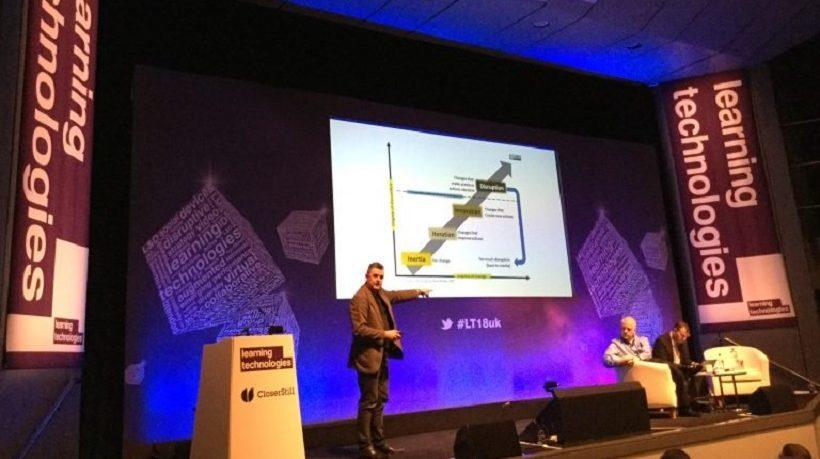Disruption In Learning: Are We Really Ready For It?
Elon Musk firing a car playing David Bowie into space seemed a fitting end to a week of post-Learning Technologies reflection in which ‘disruption’ featured heavily.
As all the talk upstairs at this year’s conference was about science fiction—AR, VR, AI—transforming learning, downstairs the exhibition felt as ‘safe’ as ever. This paradox is always fascinating because it begs the question ‘who drives it?’.
Hype Or Real?
Is the language that once again dominated the stands—LMS, off-the-shelf, platform, compliance—actually what buyers want, expect, and fear of alienating a conservative audience prevents vendors from ‘disrupting’ the status quo?
Or have these words become so entrenched in vendors’ mindsets, marketing and own sales pitches they simply don’t know what other language to use to excite and inspire what they might not even recognize to be open minds of buyers?
Yes there were increased exhibition smatterings of ‘microlearning’, while ‘games’ has become omnipresent, despite the sense there is still a disconnect between what is truly a learning game and simply gamification of traditional learning. Learning ecosystems were also ‘hot’ (we got there a year ago with ours folks).
And while VR, AR, and AI did have a presence downstairs, those stands were largely confined to one corner of the hall. A reflection of the confidence, or lack of it, of currently putting this technology front and center for the market?
Moving From Iteration To Innovation
Wednesday’s ‘Emerging Technologies’ Conference session featuring Steve Wheeler (Learning consultant - steve-wheeler.net) and David Kelly (Executive Director, The eLearning Guild) provided an interesting paradigm for this contradiction.
Amid the discussions on VR, AR, and AI (some of the audience still having to ask for clarity on what each actually was, by the way), Wheeler presented some work he has been undertaking on ‘Impetus of Change v Degree of Discomfort’ in learning.
By putting it in the context of inertia, iteration, innovation, and disruption, he discussed the “organizational courage to do something that’s never been done before and risk it fails”, which moves a company from iteration to innovation.
But isn’t that also true of the whole industry? Are we too beholden to what’s happened in past? Couldn’t we all be accused of being comfortable in the ‘iteration’ phase with occasional glimmers of innovation? And isn’t this innovation, when it does occur, arguably driven more by the demands of learners than the industry itself?
Take mobile learning, for example. Did we design the apps and technology and ‘sell’ it as a must-have to learners, or did we react to the fact learners’ lives are now mobile-led and we came up with learning to convenience them? The latter, surely?
Having been working with Dr Kevin Burden at the University of Hull on his ideas, Wheeler went on to explore how ‘over-disruption’ can have a counter-productive impact and take a firm back to inertia if it’s too much too soon.
Ego, Bravado, And Taste For The Absurd
The Guardian described Musk’s SpaceX mission as a result of his “ego, bravado, and taste for the absurd.” Here is a genuine disrupter. So where is our industry’s ego, bravado and taste for the absurd?
We might be talking up the future potential of AR, VR, and AI in learning, but who is going to take this and make it become a reality and put it front and center in the exhibition hall? Who is going to send our learning Tesla Roadster into orbit and create the imagery and the same sense of possibility that nothing will ever be the same again?
After all there seems little doubt if learners in many firms, especially those we work with in financial services, suddenly had AR and VR-centered learning foisted on them, it would be a one-way ticket back to inertia once the instant novelty had worn off. And who can afford it at the moment anyway?
Most likely the biggest disruption in learning won’t come from our industry itself. In the same way Amazon swooped in and changed book buying forever—it wasn’t a traditional book retailer that took it online—it’s wholly feasible it will be the ego, bravado, and taste for the absurd of someone outside of learning that transforms it.
Are we really ready for that?









